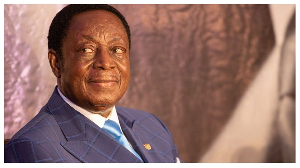Accra, July 21, GNA- Dr Nii Noi Ashong, Minister of State responsible for Economic Planning on Wednesday said the Births and Deaths Registry would be strengthened and its regional and district offices, computerised to improve coverage, which was vital to national planning.
He said even though Ghana has operated a vital registration system for the past one hundred years, the system has not attained the expected level of reliability and completeness.
Dr Ashong said, "The necessary resources should therefore be mobilized within government departments to make the registration of births and deaths more effective".
These were contained in a speech read for him at the opening of a two-day stakeholders meeting on civil registration being organized by Ghana Statistical Service (GSS) in collaboration with the United Nations Children's Fund (UNICEF) and the Births and Deaths Registry in Accra. Participants are from the Ministries of Local Government and Rural Development, Finance and Economic Planning, Health, Employment and Manpower Development, Women and Children's Affairs and Education, Youth and Sports.
Others are from the National Population Council (NPC), Ghana Health Service (GHS), UNFPA and Non-Governmental Organizations (NGOs). They are expected to deliberate on the constraints and challenges facing the producers and users of vital statistics and to come up with realistic strategies for increasing the coverage of civil registration in Ghana.
Dr Ashong said that the coverage of events like births and deaths- components that are integral to the estimation and projection of population growth, size, age and sex distributions- was very low across the country.
He said information from a well functioning civil registration system served a wide range of uses and that quality data of births and deaths was needed and be made available to policy makers to better inform development planning.
"Civil registration fulfils very important needs in any country. The Government of Ghana needs accurate, reliable and timely data on fertility and mortality for its planning, he said."
Over 70 percent of newborn children in Ghana are not registered and the Births and Deaths Registry captured only 31 per cent of total births expected for 2000, dropping to 27 percent in 2001 and further dropped in 2002 to 17 percent.
"Even though it went up to 28 percent in 2003 it did not reach the previous level of 31 percent. The situation is worse for death registration and one does not have any idea about the level of registration of deaths in the country."
He noted that since population censuses in Ghana have been conducted at 13-year intervals, in the intervening periods between censuses, vital statistics from civil registration would provide the basis for assessing changes in the population.
These statistics, he said, were fundamental to planning in most policy areas particularly in education, employment and health, such as in the planning for educational services, provision of health facilities and services to infants, children, adolescents, women of reproductive age and the elderly.
He noted that the reliance on ad-hoc household surveys to obtain fertility and mortality rates and life expectancy did not give accurate estimates of these statistics.
To mitigate the problem, Dr Ashong suggested the increment of local registration offices to aid the Births and Deaths Registry to improve the coverage of births and deaths registration in most rural areas. He also suggested that the populace be educated and motivated on the importance of births and deaths registration, equipping local registrars with necessary resources and logistics to operate effectively and putting measures and controls in place to check and monitor the proliferation of uncontrolled cemeteries and burials without permit. He urged the participants to review other ways in which other organization could help improve the country's registration system.
Mr. Kwadwo Agyei Darko, Minister of Local Government and Rural Development said an efficient birth and deaths registry was important to development planning because the greatest asset of any nation was its people.
He noted that the current low coverage of events across the country remained a serious concern to the Registry, the nation and other international bodies who relied on births and deaths registration data in one way or the other.
He said the Ministry was supporting the Births and Deaths Registry to develop a scheme that would decentralize the registration process through innovative mechanisms.
Consequently, the Ministry, the Registry and the Institute of Local Government are collaborating to train volunteers in the collection of information on births and deaths in 20 selected districts on a pilot basis.
He said community involvement in the registration process would engender a sense of community-ownership and commitment to the entire process.
The situation could be improved through the effective collaboration among all agencies connected with the production or usage of vital registration data.
Mr. Darko called on stakeholders to work in close collaboration with the Registry and it's parent Ministry to put the registration machinery on a solid track.
Ms. Dorothy Rozga, Country Representative of UNICEF commended the government of Ghana for its recent ratification of the African Charter on the Rights and Welfare of the Child.
She said the African Instrument, in line with the Convention on the Rights of the Child, reinforced the right of every child to be registered immediately after birth.
She noted that lack of registration was a violation of the child's inalienable human right because its identity at birth was being unknown and was being denied as part of the society.
"The importance of this right cannot be underestimated as birth registration can be entry point to the realization of many other rights.
The rights to education, to health, to nationality, to association and to parentage all depend on the ability to demonstrate identity."
She said the meeting marked a significant milestone in the registry of births and deaths because it was providing a platform to jointly address the issue and urged the participants to come out with realistic recommendations.
General News of Wednesday, 21 July 2004
Source: GNA
















